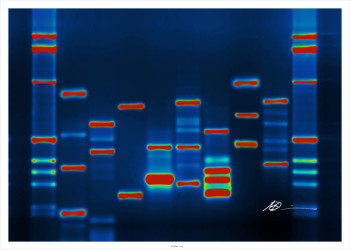
Microsoft has partnered with a San Francisco-based company to encode information on synthetic DNA to test its potential as a new medium for data storage.
Twist Bioscience will provide Microsoft with 10 million DNA strands for the purpose of encoding digital data. In other words, Microsoft is trying to figure out how the same molecules that make up humans’ genetic code can be used to encode digital information.
While a commercial product is still years away, initial tests have shown that it’s possible to encode and recover 100 percent of digital data from synthetic DNA, said Doug Carmean, a Microsoft partner architect, in a statement.
Using DNA could allow massive amounts of data to be stored in a tiny physical footprint. Twist claims a gram of DNA could store almost a trillion gigabytes of data.
Finding new ways to store information is increasingly important as people generate more and more data in their daily lives, and as millions of connected IoT sensors start to come online.
It’s also important for Microsoft, which operates one of the biggest public cloud platforms. Finding more efficient ways to store data could reduce its costs, and DNA-based storage has the potential to last longer than existing media.
“Today, the vast majority of digital data is stored on media that has a finite shelf life and periodically needs to be re-encoded. DNA is a promising storage media, as it has a known shelf life of several thousand years, offers a permanent storage format and can be read for continuously decreasing costs,” said Twist CEO Emily Leproust in a statement.
It remains to be seen what the results of the collaboration will be, but it’s a further step towards making DNA-based computers a practical reality.
This article was originally published on www.pcworld.com and can be viewed in full
 (0)
(0) (0)
(0)Archive
- April 2024(73)
- March 2024(112)
- February 2024(109)
- January 2024(95)
- December 2023(56)
- November 2023(86)
- October 2023(97)
- September 2023(89)
- August 2023(101)
- July 2023(104)
- June 2023(113)
- May 2023(103)
- April 2023(93)
- March 2023(129)
- February 2023(77)
- January 2023(91)
- December 2022(90)
- November 2022(125)
- October 2022(117)
- September 2022(137)
- August 2022(119)
- July 2022(99)
- June 2022(128)
- May 2022(112)
- April 2022(108)
- March 2022(121)
- February 2022(93)
- January 2022(110)
- December 2021(92)
- November 2021(107)
- October 2021(101)
- September 2021(81)
- August 2021(74)
- July 2021(78)
- June 2021(92)
- May 2021(67)
- April 2021(79)
- March 2021(79)
- February 2021(58)
- January 2021(55)
- December 2020(56)
- November 2020(59)
- October 2020(78)
- September 2020(72)
- August 2020(64)
- July 2020(71)
- June 2020(74)
- May 2020(50)
- April 2020(71)
- March 2020(71)
- February 2020(58)
- January 2020(62)
- December 2019(57)
- November 2019(64)
- October 2019(25)
- September 2019(24)
- August 2019(14)
- July 2019(23)
- June 2019(54)
- May 2019(82)
- April 2019(76)
- March 2019(71)
- February 2019(67)
- January 2019(75)
- December 2018(44)
- November 2018(47)
- October 2018(74)
- September 2018(54)
- August 2018(61)
- July 2018(72)
- June 2018(62)
- May 2018(62)
- April 2018(73)
- March 2018(76)
- February 2018(8)
- January 2018(7)
- December 2017(6)
- November 2017(8)
- October 2017(3)
- September 2017(4)
- August 2017(4)
- July 2017(2)
- June 2017(5)
- May 2017(6)
- April 2017(11)
- March 2017(8)
- February 2017(16)
- January 2017(10)
- December 2016(12)
- November 2016(20)
- October 2016(7)
- September 2016(102)
- August 2016(168)
- July 2016(141)
- June 2016(149)
- May 2016(117)
- April 2016(59)
- March 2016(85)
- February 2016(153)
- December 2015(150)